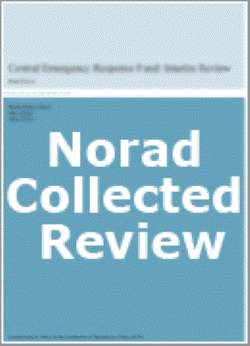The Office of the Ombudsman (OoO) in Malawi : An Appraisal
About the publication
- Published: May 2007
- Series: Norad Collected Reviews
- Type: --
- Carried out by: Bård A. Andreassen (UiO) and Thor Oftedal (Norad)
- Commissioned by: Royal Norwegian Embassy, Lilongwe
- Country: Malawi
- Theme: Governance and democracy, Human rights
- Pages: 28
- Serial number: 5/2007
- ISBN: 978-82-7548-198-4
- ISSN: --
- Project number: MWI-02/252

The Project
The Office of the Ombudsman is a constitutional body, established by the 1994 Constitution of Malawi. It became "operational" in 1996, and may investigate "cases where it is alleged that any person has suffered injustice, and it does not appear that there is any remedy reasonably available by way of proceeding in the court or by way of appeal from a court or where there is no other practicable remedy"
The Malawian Office of the Ombudsman (OoO) has received funding from Norway and Sweden since year 2000. For the period 2002 - 2008 an amount of NOK 5, 1 million has been agreed.
Findings
• The overall conclusion is that the Office of the Ombudsman is an important governance institution in terms of enhancing a public awareness about the misuse of public office. It relies to a large extent on the reputation and public outreach of the current Ombudsman.
• The Office of the Ombudsman is known to keep a high public profile. The Ombudsman himself is highly respected, and has received public awards for his work.
• The office opens about 500-600 cases every year. In addition they reduced the backlog of cases by about 400 in 2006.
• The office grapples with significant institutional weaknesses, which need to be resolved. External aid will not alone resolve these weaknesses.
• Key challenges are enhancing financial control and introduce transparent rules for management and strategic/cost-efficient use of resources. Financial commitment from the Malawi Government is essential to achieving long term financial sustainability.
• The Office should focus on producing and improving the system of case reporting statistics that reflect the case load, processing and conclusion of cases on a continuous basis.
• Some initiatives to improve the administrative procedures and performances have been introduced. The report, however, recommends that a plan for institutional reform and development with realistic goals of achievements and timeframes is developed.
• The authors of the report recommend that the Norwegian Embassy enters into a third phase of two years of support.
